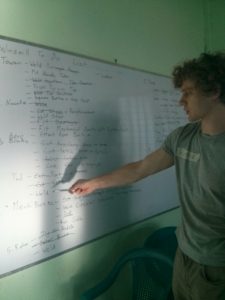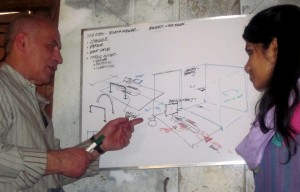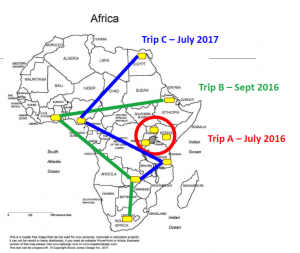Rapid and large-scale urbanization, together with a drive towards environmental and financial sustainability, creates considerable challenges and opportunities for engineers and engineering education in Africa. The Engineering Education for Sustainable Cities in Africa (EESC-A) initiative is multi-faceted across multiple dimensions urban issues, sustainability, climate change, Global South & Global North, and existing versus new forms of university level pedagogy. It addresses two deep global challenges: (1) enabling the creation of sustainable infrastructure for the future mega-cities in Africa, which will be the largest cities in the world by 2100, and (2) using advances in education, which we are researching and experimenting with on campus at UofT today, to help scale up the training for the required cadre of engineers – both African and Canadian to build out African cities.
Led by CGEN co-founder and Senior Fellow at the Global Cities Institute, Murray Metcalfe, EESC-A explores the status of engineering education in Sub-Saharan Africa (SSA), opportunities and challenges that its academic institutions encounter, and the extent to which new education models based on information technologies are being implemented. Such models include distance learning, the use of “MOOCs” and “SPOCs,” and the roles of engineering software tools and “virtual labs.” Geographically, the initiative has a pan-African mandate, and it seeks to contribute where resource constraints amplify related challenges, while simultaneously innovation in education may have the greatest social and environmental impact.
As a way of greatly accelerating those efforts, the initiative seeks to create a new partnership called the Network for Engineering Education for Sustainable African Cities (NEESAC). Its long-term goal is to build a network of researchers and collaborators centered here at UofT, with additional participants and partnerships elsewhere in engineering schools (and other institutions) in Canada and in Africa.
Its specific objectives will be: (1) working with and facilitating African educators and theorists to define what is sustainable cities engineering from an African perspective, (2) developing relevant content modules and courses, some broad and some specific to countries, issues and even specific institutions, (3) partnering with African universities more broadly, primarily through electronic approaches, to help them in educating future engineers, (4) actively involving UofT scholars and students in engaging with African counterparts, by pointing to specific issues and topics for research efforts, and (5) pursuing resulting “reverse innovation” opportunities for our students and our educational activities on campus at UofT.






